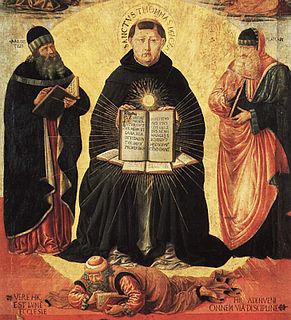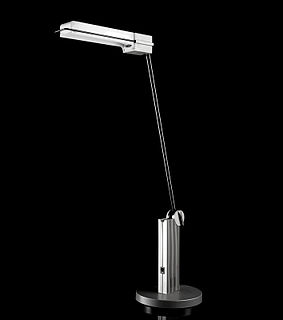
Giulio Cesare in Egitto, commonly known as Giulio Cesare, is a dramma per musica in three acts composed for the Royal Academy of Music by George Frideric Handel in 1724. The libretto was written by Nicola Francesco Haym who used an earlier libretto by Giacomo Francesco Bussani, which had been set to music by Antonio Sartorio (1676). The opera was a success at its first performances, was frequently revived by Handel in his subsequent opera seasons and is now one of the most often performed Baroque operas.
Ptolemy is a name derived from Ancient Greek. Common variants include Ptolemaeus (Latin), Tolomeo (Italian) and Talmai (Hebrew).

The Tolomeo incandescent desk lamp is an icon of Italian modern design. It was designed by Michele De Lucchi and Giancarlo Fassina in 1986 for the Artemide company. In its original configuration, it consists of a heavy base, two straight polished aluminum arm sections, and a matte aluminum reflector head which can swivel 360°. Steel tension cables attached to springs hidden inside the arms complete the constant-tension structure. Tolomeo is the Italian version of the name Ptolemy. In the dot-com period, it became popular as a symbol of conspicuous consumption and high design consciousness in high-tech companies as well as in architectural and graphic design offices. It won the Compasso d'Oro design prize in 1989.

Tolomeo, re d'Egitto is an opera seria in three acts by George Frideric Handel to an Italian text by Nicola Francesco Haym, adapted from Carlo Sigismondo Capece's Tolomeo et Alessandro. It was Handel's 13th and last opera for the Royal Academy of Music (1719) and was also the last of the operas he composed for the triumvirate of internationally renowned singers, the castrato Senesino and the sopranos Francesca Cuzzoni and Faustina Bordoni.

The Geography, also known by its Latin names as the Geographia and the Cosmographia, is a gazetteer, an atlas, and a treatise on cartography, compiling the geographical knowledge of the 2nd-century Roman Empire. Originally written by Claudius Ptolemy in Greek at Alexandria around AD 150, the work was a revision of a now-lost atlas by Marinus of Tyre using additional Roman and Persian gazetteers and new principles. Its translation into Arabic in the 9th century and Latin in 1406 was highly influential on the geographical knowledge and cartographic traditions of the medieval Caliphate and Renaissance Europe.

The counts of Tusculum were the most powerful secular noblemen in Latium, near Rome, in present-day Italy between the 10th and 12th centuries. Several popes and an antipope during the 11th century came from their ranks. They created and perfected the political formula of noble-papacy, wherein the pope was arranged to be elected only from the ranks of the Roman nobles. The pornocracy, the period of influence by powerful female members of the family, also influenced papal history.
Ptolemy was a Greek mathematician, astronomer, geographer and astrologer.
Ptolemy I was the count of Tusculum in the first quarter of the twelfth century. He was a son of Gregory III. Peter Pisanus, in his Vita Paschalis II refers to Ptolemy and the abbot of Farfa as the allies of the emperor in the same way that the Saints Peter and Paul were the allies of the pope.
Ptolemy II was the count of Tusculum and consul of the Romans from 1126 to his death. He was the son and successor of Ptolemy I.

Bartholomew of Lucca, born Bartolomeo Fiadoni, and also known as Tolomeo da Lucca or Ptolemy da Lucca, was a medieval Italian historian.

Artemide is a design-oriented Italian manufacturer founded by Ernesto Gismondi and Sergio Mazza in 1960. Based in Pregnana Milanese, a suburb of Milan, the company specialises in the manufacture of lighting designed by designers and architects.

A balanced-arm lamp, sometimes called a floating arm lamp, is a lamp with an adjustable folding arm which is constructed so that the force due to gravity is always counteracted by springs, regardless of the position of the arms of the lamp. Many lamp brands as well as other devices, such as drawing boards, use this principle.
"Svegliatevi nel core" is an aria taken from act 1, scene 4 of the Italian language opera seria, Giulio Cesare, by George Frideric Handel. The aria is written for the role of Sesto, a soprano in trouser role, including during the premiere, who sings it to assure his mother that he will avenge the death of his father, Pompey, who was assassinated by the Egyptians, instructed by Tolomeo to demonstrate the Egyptians' loyalty to Julius Caesar. The words were written by Nicola Francesco Haym.
The song "Silent Worship" is a 1928 adaptation by Arthur Somervell of the aria "Non lo dirò col labbro" from Handel's 1728 opera Tolomeo (Ptolemy). Somervell's English-language adaptation is for voice and piano, and it has remained a popular classic in song recitals and home music-making. Other arrangements of Somervell's translation include voice accompanied by a modern symphony orchestra, and male choir.
Tolomeo was an Irish-bred, British-trained Thoroughbred racehorse and sire. He is best known for his upset victory in the 1983 Budweiser Million, when he became the first European horse to win the race and the first British-trained horse to win a major race in the United States for fourteen years. He recorded only one other success in a seventeen race career but was placed in many major European races including the 2000 Guineas, Eclipse Stakes, Sussex Stakes, Benson and Hedges Gold Cup, Champion Stakes and King George VI and Queen Elizabeth Stakes. After his retirement from racing he stood as a breeding stallion in Australia with moderate results.

La Dori, overo Lo schiavo reggio is a tragi-comic opera in a prologue and three acts composed by Antonio Cesti to a libretto by Giovanni Filippo Apolloni. It was first performed in the court theatre at Innsbruck in 1657. The story is set in Babylon on the shores of the Euphrates and is a convoluted tale of mistaken identities—a female protagonist who disguised as a man eventually regains her lost lover, and a man disguised as a woman who causes another man to fall in love with him. In several respects it resembles the plot of Cesti and Apolloni's earlier opera L'Argia and foreshadows Apostolo Zeno's libretto for Gli inganni felici (1695) and Metastasio's libretto for L'Olimpiade (1733). The first Italian staging of La Dori was in Florence in 1661 for the wedding of Cosimo III de' Medici, Grand Duke of Tuscany. It subsequently became one of the most popular operas in 17th-century Italy. The opera was revived three times in the 20th century, beginning in 1983.

"Va tacito e nascosto" is an aria written for alto castrato voice in act 1 of George Frideric Handel's opera Giulio Cesare in Egitto, composed in 1724 to a libretto by Nicola Francesco Haym. Sung by the character Julius Caesar, it features extensive solos for natural horn.

Michele de Lucchi is an Italian architect and designer
Tolomeo e Alessandro, ovvero la corona disprezzata is an Italian-language opera by Domenico Scarlatti to a libretto by Carlo Sigismondo Capece which premiered in Rome on 19 January 1711 at the Palazzo Zuccari, with scenery by Filippo Juvarra. It was second of the seven operas composed by Domenico for the Polish queen Maria Casimira Sobieski, following his pastorale in three acts La Silvia of 27 January 1710.
Tolomeo Faccendi was an Italian sculptor, active mainly in his native Tuscany.









